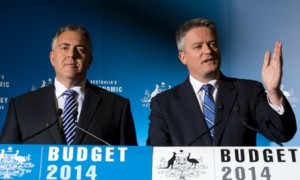Budget brings mixed bag for humanitarian and CALD sectors
 People at the bottom of the socio-economic ladder – the unemployed, young people, pensioners and refugees and asylum seekers – will be hardest hit by the swingeing cuts and changes to benefits and services in the 2014 Federal Budget.
People at the bottom of the socio-economic ladder – the unemployed, young people, pensioners and refugees and asylum seekers – will be hardest hit by the swingeing cuts and changes to benefits and services in the 2014 Federal Budget.
Treasurer Joe Hockey has endeavoured to live up to Prime Minister Tony Abbott’s assertion that we must all shoulder the burden of repairing national finances, but most middle to high income earners have gotten off lightly.
As far as the CALD, migration and humanitarian sectors are concerned, there are mixed outcomes.
The provision of $27.8 million in 2014-15 to continue to fund the Asylum Seeker Assistance Scheme (ASAS) and the Community Assistance Support Program (CAS) has been welcomed by the humanitarian sector; as has the continuation of support services to asylum seekers, including access to Torture and Trauma Support and Complex Case Support, and a range of employment services and support through Job Services Australia to assist those eligible to work gain employment.
The federal government has promised to prioritise the business visa, skilled and family migration programs. Of a total of 190,000 migration places in 2014-15, 128,550 will be reserved skilled migrants and 60,885 for families.
And 4000 places will be provided each year under the Special Humanitarian Program that will see humanitarian visa entrants reunited with their families.
Specialised settlement services have been maintained with HSS funding continuing in 2014-15, in line with the three-year renewal of HSS contracts which took place in April.
The budget allocation for the Adult Migrant Education Program (AMEP) and Skills for Education and Employment (SEE) will continue in line with current levels.
The government’s commitment to provide better aged care for CALD Australians has been welcomed by ethnic groups; as was a commitment to develop curricula and revive the teaching of foreign languages in Australian schools. But people on low-incomes, many of whom are newly arrived to Australia, will find it harder to make ends meet because of a raft of extra imposts they will face.
A visit to a GP and some screening, such as X-rays and blood tests, will cost $7, even at bulk billing clinic; and prices of commonly used medicines and drugs will rise by an average of $5.
Petrol excise will now be indexed to inflation meaning prices being about 1c a litre higher at the pump.
Deregulated higher education will make degrees or diplomas more expensive and the effect of this will be exacerbated by higher interest rates charged on NECS/HELP student loans.
Family Tax Benefits will now only be received by families with a combined income of less than $100,000 and then only until their youngest child turns six.
Around 370,000 Australians on the Newstart Allowance, parenting payments and Youth Allowance will find themselves with new thresholds on the amount of money they can earn and still receive some of the their welfare payments. They will also find new arrangements around their eligibility for benefits.
Eligibility thresholds for welfare payments, including non-pension payments such as Family Tax Benefits, Child Care benefit, Child Care Rebate, Newstart Allowance, Parenting Payments and Youth Allowance, will be frozen for three years from July 2014.
This may significantly affect young refugees and migrants seeking work who do not have family support in Australia. They will have to wait six months to get benefits which will then be at a reduced level until they turn 25. People between 25 and 30, except in exceptional circumstances, will receive the Newstart Allowance for just six months.
Furthermore, cuts to Job Services Australia, including the restricting of participation for volunteers and the end of the Experience + Career Advice program and of Connection Interviews and Job Seeker Workshops, could hurt the job prospects of unemployed CALD Australians.
Pensions will be indexed to inflation rather than the average male wage, as is currently the case, meaning they will rise more modestly. The pension age will ultimately rise to 70, concessions will be cut and pensioners will be able to hold fewer assets and still receive a full pension from 2017.
One of the biggest economic levers Treasurer Joe Hockey pulled in delivering his first budget was to cut $80 billion from funding for schools and public hospitals over the next decade. This will put pressure on the states’ finances and could see cuts to community services, on which many people newly arrived to Australia rely.
It could force the states to increase public transport fares and will almost certainly spark debate about the need to hike up the GST – which would make household necessities more expensive.
Added to this is the Government’s decision to cut funding to local councils by $1 billion over four years. This will also impact on community services and resources which are particularly valued by refugees and asylum seekers.












